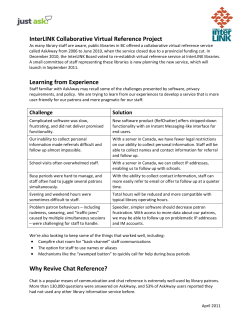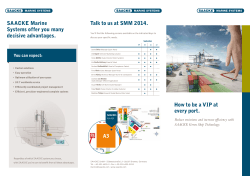
When companies started building call centers offshore
If You Want to Scream, Press... Monday, October 30, 2006 Do call centers have to be so infuriating? By Sarmad Ali When companies started building call centers offshore records how many times callers were transferred or put But if the question is unpredictable and there is no and shipping work to outsourcers thousands of miles on hold, for how long they were on hold -- and what stock answer, the query will be forwarded to a live away, it was hailed as a great way to cut costs. the agent was doing on his or her screen while the call agent.This agent can often handle several real-time chat was in progress. About 150 companies are using NICE sessions at once efficiently and accurately and with cus- Perform's emotional detector, including FedEx Corp.'s tomized information.This reduces personnel costs and FedEx Custom Critical unit, says Eyal Danon, vice presi- provides a service many customers prefer, the company dent of marketing communications at NICE Systems. says. Convergys Corp., a Cincinnati-based call-center opera- However, some analysts say using email and chat can't tor with offshore operations, uses an in-house product be a panacea for call-center problems. Email responses, with artificial intelligence to help agents assist cus- for example, though sometimes automated, don't tomers.The product, called Agent Voice Assist, is an always provide an immediate answer. If a customer is automated system that monitors contact between cus- dealing with a bank, for instance, and wants to stop pay- tomer-service reps and the customers, similar to the ment on a check, it could take a few days for the bank way supervisors randomly listen in on calls into a serv- to respond to the request.This is why financial institu- ice center. While a call is still in progress, the application tions have not adopted email, says Esteban Kolsky, a uses speech-recognition software to distinguish what research director in Reno, Nev., for Gartner Inc. But over time, many companies were inundated with customer complaints about agents' competence, professionalism and knowledge of products.There were also cultural hurdles and miscommunications, including difficulty understanding different accents. Today offshore outsourcers face too much competition not to focus on improving their service, while keeping costs down, too, of course. In addition to India and the Philippines, new centers are spreading to countries like Colombia and Brazil. Some companies are even moving resources back to the U.S., aided by cost reductions achieved through Internet telephony. Faced with new pressures, offshore resourcers are striv- Convergys calls "reasonable" speech from speech indi- ing to make their agents and the processing of calls cating dissatisfaction. Once a conversation crosses over more efficient through new telecommunications and that line, the system flags the call to be taken over by computer technologies.They are spending more time another agent or sent to another department. and money training agents, and trying to retain the more talented ones by offering incentives including higher salaries, gifts and educational opportunities. Chat sessions also have their flaws. Because the agent and the customer type out their questions and answers, the exchange is a little less personal than having an individual's attention on the phone. And if the interaction Another in-house software system at Convergys uses becomes complex, it sometimes is more cumbersome speech recognition to speed up service by pushing to than handling the problem by talking. Chat can also be the computer screens of the agents the information unpopular among people who are bad at typing or who Many of the software solutions involve automation. most relevant to a caller's needs. For example, if a caller have trouble using computers. NICE Systems Ltd., of Israel, for example, sells software wants to update his or her address, the agent says that helps identify patterns in the needs customers are "update address." The system then brings up the reporting. In 2004, the company launched NICE address-change page immediately without the agent Perform, an automated system that digitally records having to go through menus to reach it, thus speeding conversations between customers and agents and then scans them for certain words. If a customer says "cancel," for example, the software flags the conversation and sends a report to the management of that company so it can find out more about the customer's dissatisfaction.The identity of the caller is recorded as well, and a supervisor from the client company will call the customer asking why he or she was upset, and hopefully offer a solution. up the call. Help Yourself In addition to automated tools, some outsourcers are using systems that employ self-service, like email and chat sessions, in which customers type their questions in a window on the Web site, and an agent writes back in real time -- hopefully, with helpful answers. Convergys, for its part, uses chat sessions that combine both automation and live agents. Frequent customer ques- In the Mood tions posed in chat sessions -- such as "How do I NICE Perform also can track the emotions of cus- update my billing address?" -- receive automated tomers and agents during the course of a call, based on responses. changes in pitch, flow and rhythm of the voices. It also "Most companies expect that chat and email will replace phones [in call centers], but that's not happening," says Mr. Kolsky. Currently only 5% of customers seeking help from an outsourced call center use chat and 10% to 15% use email, he says. SlashSupport Inc., a global technical-support outsourcer that says it handles about 1.5 million calls a month, is a big advocate of self-service tools.The company, which is based in San Jose, Calif., and has operations in India, uses one-minute, how-to video clips on its site to answer some inquiries by showing rather than telling. Right now, only 5% of SlashSupport customers use video clips -- mostly consumer-electronics companies, says Chief Executive Shiva Ramani. But the visual approach is starting to gain momentum, he says, because customers feel more comfortable and T H E WA L L S T R E E T J O U R N A L Monday, October 30, 2006 informed looking at a video rather than hearing instruc- viduals, and overall targets met by teams.The company tions on the phone.There also is no waiting on hold for says it encourages its teams to always implement new an agent. programs to recognize and reward its best performers. Mr. Ramani expects that 40% to 50% of his company's Some Come Home technical support will ultimately be delivered by Web- All of these improvements, meanwhile, haven't stopped based video. In addition to the benefits for the cus- some companies from deciding to return call-center tomers, there are huge cost savings. Instructions given resources to the U.S. and countries closer to home. over the phone can cost as much as 60% more than Some now rely on offshore outsourcers for only part of the same help delivered in a video, says Mr. Ramani.The their services, such as email and Web-based chats, while phone call may cost the company $7 to $10, which basing their call centers in the U.S.This eliminates the includes labor, equipment and other costs, the company potential for cultural and language gaps, while reducing says. A video demonstration, however, has a one-time exposure to criticisms about sending U.S. jobs overseas. production cost, after which there is no ongoing labor It also mitigates the risk of putting your company's cost.The Internet-related costs, too, of downloading and whole service operation in a distant and possibly lesssecure part of the world, says Zachary McGeary, an playing the video, are next to nothing. Be Happy While more automation is coming, call centers know their fortunes also are riding on the quality of their customer representatives. When companies started work- example, has come up with a Reward and Recognition ance.The objective is not only to help in promoting healthy competition but also to instill "a feeling of belonging and trust," says Mr. Contractor. the right agents. Now the companies make potential The company is also trying to illuminate a future career agents go through intensive screening and training path in IT by offering scholarships to its high-performing before they begin to handle customer calls. agents for distance-learning programs. And Wipro BPO gives agents the freedom to submit cost-saving ideas or Calif., which has 7,000 employees in the U.S., India, the Philippines and Guatemala, uses speech-evaluation pro- Also fueling this trend is the growing use of Internet telephony. By using VOIP, companies can route incoming phone calls to agents best able to resolve customer issues wherever the agents are, at a fraction of the cost ing offshore, they did a poor job of picking and training One company, 24/7 Customer Inc., based in Los Gatos, analyst at JupiterResearch in New York. Policy for recognizing exceptional employee perform- propose ideas that enable positive change. "We believe that people who do the job know best how to improve it," Mr. Contractor says. grams during recruitment. Potential agents are checked of traditional circuit-switched technology. The number of home-based U.S. outsourced agents is expected to more than double to 300,000 by 2010 from nearly 140,000 today, according to IDC, a research firm based in Framingham, Mass. Still, no one expects the trend toward offshore expansion to abate anytime soon. Convergys, for example, has for pronunciation, vocal quality and clarity in thought At 24/7 Customer, there are now rewards programs for and speech. Even after agents are hired, speech-evalua- staff including cash prizes or electronic devices such as tion programs are still regularly conducted. Agents are iPods. And annually the company recognizes its top- given dialogue sheets to practice handling phone calls, notch employees in an Oscar-like ceremony in front of while software rates whether they will be understood thousands of employees and their families. by native English speakers. On a day-to-day basis, meanwhile, the company is company also said it was building two new facilities in Wipro BPO Solutions, based in Mumbai, India, focuses working on retaining its better employees by focusing the Philippines, bringing its total there to five. not just on language issues but on possible cultural gaps on talent development and providing growth opportu- between callers and employees nities.The company has worked with a business school Hoshedar Contractor, general manager of Wipro BPO, a division of Wipro Ltd. of Bangalore, India.The company coaches its employees on topics like U.S. geography and ing postgraduate degrees, and it encourages agents to work in cross-functional areas such as marketing or management to expand their opportunities and expertise. holidays such as Thanksgiving, Mr. Contractor says, "so that when American customers call around that time of Equinox Corp., an outsourcer based in Irvine, Calif., year, agents can wish them a happy holiday and assist offers a variety of incentive programs including mone- them faster." By comparison, he adds, "just addressing or tary rewards to motivate and retain its talented solving a problem may sound robotic and scripted." employees.The company has designed a Variable Incentive Compensation Policy to reward its high-per- After recruiting and training, the challenge is to retain their more-talented staff.To that end, Wipro BPO, for continues to grow, according to analyst Stephen Loynd of IDC. In July, outsourcer TeleTech Holdings Inc., based in Englewood, Colo., opened a facility in Guadalajara, Mexico, its third in that country. Last November, the in India to provide executive education to agents pursu."The biggest challenge is the cultural mismatch," says a head count of more than 10,000 people in India and forming agents based on two levels: targets met by indi- Not content to rest on past accomplishments, offshore outsourcers know the race they're in is a long haul. As Sudin Apte, an analyst at Forrester Research Inc. in India, says, "Building offshore capability is a journey and not a quick fix."
© Copyright 2025





















